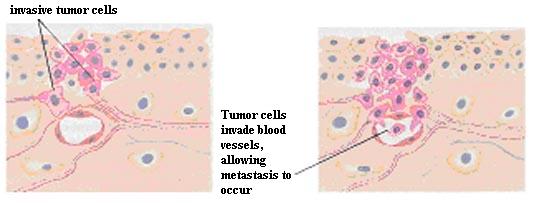Cancer
Cancer is a fundamental aberration in cellular behaviour, touching on many aspects of molecular cell biology.
Cancer cells also invade surrounding tissues, often breaking through the basal laminas that define the boundaries of tissues and spreading through the body to establish secondary areas of growth, a process called metastasis.

Most cell types of the body can give rise to malignant tumor cells. A normal cell can be transformed to malignancy by the expression by one or a few oncongenes.
Oncogenes are formed in cells or carried into cells by transforming agents, of which we recognized three main types : virusis, chemical carcinogens, and radiation.
Transformed cells differ from normal cells in many ways, including cell-growth control, cell morphology, cell-to-cell interactions, membrane properties, cytoskeletal structure, proteine secretion, gene expression, and mortality (cultures of transformed cells can grow indefinitely).
This is what we are interested in : indeed
the role of the epothilone is to stop the cells proliferation in preventing from the mitosis, which contributes to make the apoptosis possible.

